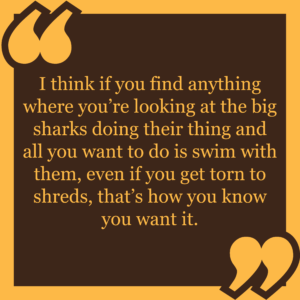 Name: Maxi Witrak
Name: Maxi Witrak
Website: www.maxiwitrak.com
Why We’re Laughing: Witrak’s subtle and subdued delivery allows for the punchlines to sneak up on you, often tickling your funny bone well after she has already moved on in her set, making for a surprising game of comedic catch up!
TrunkSpace: Was comedy always in the cards? Were you a “funny” kid, even at an early age?
Witrak: I was never the class clown or cool enough to be “the funny one.” Usually I was the one making a weird joke that all the cool kids kind of made a side eye at me for. One day after a joke one of these girls sort of goes quiet, squints at me, and goes, “…OHHHHH, you’re being FUNNY!” And it was like this whole time she/they hadn’t realized they were jokes and after that I made sense to them.
TrunkSpace: When did you decide to pursue stand-up comedy as a career and did you make a plan for how you would attack things?
Witrak: At first I liked sketch and improv, but those all demanded too much extra time of trying to organize people before even getting to get down to the work. As someone also pursuing acting and trying to have a life I thought of trying stand-up so that I could just rely on myself.
When I started, I thought I could bypass the slog of open mics by trying to out-write the process. The thought of staying up late night after night sounded miserable to me. So I was doing real shows every few weeks as my only stage time and was awful, of course. Somewhere in there I decided to stop being casual about it and let myself care enough to go for it. Every day I’m doing something towards it – writing, doing an open mic, doing a show, seeing a show, even if it’s just watching stand–up online. I literally check off each day that I’ve done something.
I think when I realized stand-up was my passion though was when going to the shows I would get insanely jealous of the comics. Just aching to get to be up there whether I was good or bad. I think if you find anything where you’re looking at the big sharks doing their thing and all you want to do is swim with them, even if you get torn to shreds, that’s how you know you want it.
TrunkSpace: How long did it take for you to discover your voice as a comic?
Witrak: I’m still discovering it, every set. Sometimes I’ll watch a comic’s special and find that my entire set that night has picked up their accent, if you will. What I always try to steer back to is, who do I most want to get to be? What kind of person am I most jealous of because it seems like they’re having the most fun?
TrunkSpace: Is the approach you take now on stage different from the approach you took when you first started out? Is it one act that grew into itself or would you consider them two completely different acts?
Witrak: When I first started out, I’d describe myself as the poor man’s Amy Schumer. A lot of crude dick jokes and dad incest one-liners just because I was trying out the misdirect and play on words for the first time. I was also completely cut off from the audience, like I was reciting a presentation.
A lot of times I really want to fall back on the comfortable feeling of knowing each line by rote, but I’m starting to move into the space where I can just talk to the audience and be comfortable relying on myself to be my own parachute. Either method could kill or flop, but only one of them is exciting and worthwhile to me.
TrunkSpace: Is the neon “Open” sign in your brain always turned on, and by that we mean, are you always writing and on alert for new material?
Witrak: Always. I’m known for making myself a quick note on my phone anytime something funny or strange happens (or, since the damn iPhone Notes slowdown, scribbling on my hand). It’s got to be annoying as hell for my poor friends – because as much as I want to enjoy the laugh in the moment my wheels are already turning for how to spin it into a bit.
TrunkSpace: How much work goes into a joke before it’s ready to be tested out in front of a live audience?
Witrak: I’ll take something to an open mic as soon as I think of it. Sometimes it’s a half thought that occurred to me as I’m getting ready to go on stage, sometimes I’ve dumped three pages of word vomit on one theme into my laptop and have to start sifting through all that rubble for the tiny viable chunks that emerge by talking through it out loud. If I can talk through my thought process and get some response from the other comics, I know there’s something there and just have to keep tightening and tightening it ‘til I get it clean. Usually it crystallizes within a few mics; sometimes I have to go back to the writing table and squint at it ‘til I dig the final version out. But I don’t like to invest the time in getting it 100 percent lean before taking it to a mic and sizing up whether it’s viable in the first place.
TrunkSpace: If a joke doesn’t seem to be working, how many chances do you give it in a live setting before you decide to rework it or move on from it altogether?
Witrak: I don’t put much store in the volume of reactions at an open mic, but if I’ve done something in front of a live audience two to three times and already taken a closer look to see whether I’ve set it up in a way that just isn’t making sense from the audience’s perspective, I’ll scrap it. I keep everything in case some bit of it is salvageable as an observation but sometimes by abandoning it for a few months I inadvertently end up writing a bit with a different premise that absorbs it.
TrunkSpace: Is it possible to kill one night and bomb the next with essentially the same set, and if so, what do you chalk that up as?
Witrak: Totally possible. I try to avoid blaming the audience but they have probably the most to do with it. I used to be a very competitive horseback rider and when I would get frustrated for a bad ride my trainer would always say “don’t blame the horse.” AKA, take responsibility for it, and use it to make you better. If you’re always blaming the audience or the writing of the scene or the horse, you’re never going to turn that awareness inward and make the needed changes to improve.
But yes, it is totally possible to have just a crap audience. Often it’s the environment – something in the circumstances have psychologically set them up to be poor audience members during your set. Time of night, demographics of the audience, quality of the venue’s food, whether there’s a door that keeps opening and closing and grabbing attention, seating arrangement, etc. Sometimes the setup makes the audience feel like they’re at a play and afraid to make noise rather than being active participants. I’ve done some painful sets in makeshift venues.

TrunkSpace: Does a receptive and willing audience fuel your fire of funny and help to put you on your game for the rest of your set?
Witrak: Absolutely. The more confident you are, the more fun you’re having up there, the more you start reaching for those bold choices or improvised moments that take it to the next level.
TrunkSpace: What is your most memorable performance experience (good or bad!) that will stick with you for the rest of your career and why?
Witrak: I finished a set one time and one of the male comics on the show came up to pay me all sorts of compliments about my writing. He offered to help get me on his friend’s show because he thought I was really funny, then immediately undercut it with “and you’re pretty cute, so sure.” I think any female reading this knows the precise and insidious difference I mean between a compliment on your appearance and a compliment on your appearance at the expense of the rest of you. Someone hitting on me doesn’t send me into a rage. Someone bullshitting me about the thing I’m working my ass off for does.
It reminded me that even though the comedy circles are small and it might feel like I constantly have to put up with that type, I can still choose who I invest my time and respect in, and I’m really lucky to have met quite a few bonafide good human beings so far. I do my best to surround myself with the genuine good guys who treat me like just another comic and not just a “female comic.”
TrunkSpace: How do you handle hecklers? What approach do you take?
Witrak: I’ve had people disrupt a show but never outright heckle. Hating on an audience member is off-brand for me; I want everyone to have a good time. And if I shame someone outright, the whole audience is going to shrink inside themselves. I try to bring everyone in on the joke including the person who’s causing the problem, like they’re the drunk friend we’re humoring by giving a final beer while taking their keys from them.
TrunkSpace: What are your thoughts on the stand-up landscape in 2018? Are you optimistic for the future of live comedy?
Witrak: Living in LA spoils me, because no matter what type of comic you are, you have a place to work on your craft. For the individual comic, it’s difficult to find a niche, especially given how being clean or not can funnel you different places. But for comedy as a whole, both branches further the craft in their own way; the clean ones have to come up with smarter stuff in order to work within those constraints, while the blue comics can explore and blow up existing boundaries.
I’m hoping that people will continue to come see standup live; it still seems like such a mystery to most people who aren’t in it. I’ve overheard audience members say they’ve heard a comic “do that bit before” and complain about jokes being repeated. I don’t think they realize that as easy and improvised as a skilled comic may make a bit seem, each of those five minutes were painstakingly crafted over time. Or for people who like to listen to comedy albums, it’s like owning a CD versus going to a concert. You’re getting the shiny studio-perfect version while only the people who show up at the live show get that unique, shared, imperfect experience with the magic of in-the-moment discoveries.
TrunkSpace: Finally, who do YOU find funny?
Witrak: Tig Notaro, any day of the week. She is so unbelievably present – she does not let a single bit of roadkill go under her tire without getting out of the car to inspect it. There are comics I love who write hilarious bits and make me laugh out loud from behind my laptop when I’m home needing some inspiration. But she is truly for me the embodiment of Steve Martin’s opinion that people come to know a comic’s “taste” and that’s what they come to see. Or what Garry Shandling scribbled in his journals – people don’t care what song Elvis is singing, they came to hear him be the one singing. Tig has brilliant bits, obviously, but she could be reading from a Chinese takeout menu and have everyone dying on the floor because her style and point of view are so razor-sharp you just want to hear what she thinks on everything.
Witrak is performing at the 22nd LA Comedy Festival this week. For more information and the schedule, visit here.


